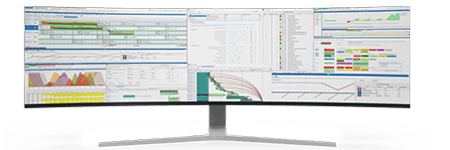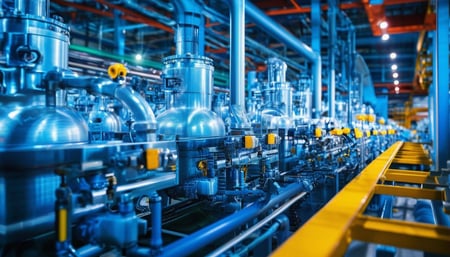Building Sustainable Supply Chains in Chemical Manufacturing
As environmental challenges increasingly impact the way we conduct business, sustainability has become a core focus across industries. Chemical manufacturing, which often faces scrutiny for its environmental impact, is uniquely positioned to lead in creating sustainable supply chains. This shift is not only essential for regulatory compliance and corporate responsibility but also as a strategic advantage.
For Supply Chain Managers in the chemical industry, building a sustainable supply chain demands balancing complex priorities—minimizing environmental impact while meeting production requirements and profitability targets.
One way to navigate these challenges effectively is through the strategic integration of advanced planning and scheduling (APS) software like PlanetTogether with established enterprise resource planning (ERP) systems such as SAP, Oracle, Microsoft, Kinaxis, or Aveva. This integration allows chemical manufacturers to optimize their supply chains, reduce waste, and enhance sustainability.
In this blog, we’ll explore how this combination can drive sustainable practices and offer actionable steps to help you leverage these tools for sustainability-focused supply chain management.

The Push for Sustainable Supply Chains in Chemical Manufacturing
The chemical manufacturing sector produces goods that are integral to a variety of industries, including pharmaceuticals, food and beverage, agriculture, and construction. However, this sector also faces some of the most stringent environmental regulations and sustainability expectations, from waste management to energy efficiency and carbon footprint reduction. Building a sustainable supply chain means:
Reducing Carbon Emissions: Minimizing transportation needs and improving production efficiency to lower greenhouse gas emissions.
Waste Reduction: Implementing practices to limit production waste, recycle materials, and manage hazardous waste responsibly.
Efficient Resource Use: Optimizing raw material usage and minimizing resource waste during production processes.
Enhancing Transparency and Traceability: Monitoring and documenting each stage of the supply chain to ensure sustainability and regulatory compliance.
While these objectives can appear daunting, integrating a solution like PlanetTogether with SAP, Oracle, Microsoft, Kinaxis, or Aveva can provide a clear path toward achieving them.
![]()

The Role of APS-ERP Integration in Sustainable Supply Chain Management
Advanced Planning and Scheduling (APS) software such as PlanetTogether offers powerful tools for optimizing production, scheduling, and inventory management—key areas where sustainability gains can be achieved. When PlanetTogether is integrated with an ERP system like SAP, Oracle, Microsoft Dynamics, Kinaxis, or Aveva, it extends the capabilities of both systems, enabling a seamless flow of data and actionable insights across the supply chain.
Here’s how APS-ERP integration can transform sustainability in your supply chain:
Optimized Production Scheduling Reduces Waste and Emissions
PlanetTogether's scheduling capabilities can significantly reduce both material waste and energy consumption. The software allows supply chain managers to model different production scenarios and identify the most resource-efficient approach. Integrating PlanetTogether with SAP, for example, allows real-time data sharing between production planning and inventory systems, ensuring that materials are only ordered and used as needed, minimizing waste.
Additionally, optimized scheduling minimizes downtime and enhances production line efficiency, resulting in lower energy usage and fewer carbon emissions. For example, by scheduling similar production runs consecutively, the system can reduce the need for equipment cleaning, thus saving water, chemicals, and energy.
Enhanced Inventory Management Reduces Overproduction
Effective inventory management is essential for a sustainable supply chain, as overproduction leads to excess inventory and waste. Integrating PlanetTogether with ERP systems like Oracle or Microsoft enables real-time visibility into inventory levels, demand forecasts, and production schedules. This level of insight allows Supply Chain Managers to adjust production based on current demand, reducing the risk of overproduction and, consequently, unnecessary resource use.
In the chemical industry, where shelf-life constraints and storage costs are significant concerns, maintaining optimal inventory levels can be both an environmental and financial win.
Improved Resource Utilization and Raw Material Efficiency
Chemical manufacturing often relies on finite raw materials that are energy-intensive to source and produce. APS-ERP integration offers greater control over raw material usage by tracking consumption in real-time. For instance, integration with Kinaxis enables supply chain managers to forecast raw material needs accurately, avoiding unnecessary orders and reducing the strain on natural resources.
Furthermore, PlanetTogether’s ability to optimize production schedules based on raw material availability allows for efficient resource allocation. This minimizes waste, reduces costs, and ensures that materials are used to their full potential before expiration, a critical factor in the chemical industry where raw materials may have limited shelf life or stability.
Boosting Transparency and Traceability for Compliance and Accountability
Achieving sustainability also requires supply chain transparency and traceability. Integrating PlanetTogether with an ERP system like Aveva enables comprehensive data capture and reporting, providing Supply Chain Managers with visibility across each stage of production and distribution. This integration allows teams to track raw materials, production processes, and final products in real-time.
Having this data readily accessible is invaluable when reporting for regulatory compliance, addressing stakeholder concerns, and tracking sustainability metrics. Transparent supply chain processes not only enhance accountability but also improve consumer trust by showing the company’s commitment to responsible manufacturing.

Steps to Building a Sustainable Supply Chain through APS-ERP Integration
Integrating PlanetTogether with SAP, Oracle, Microsoft, Kinaxis, or Aveva for sustainability requires a strategic approach. Here’s a step-by-step guide to help you maximize the benefits of this integration for sustainable supply chain management:
Step 1: Conduct a Sustainability Audit
Before implementing APS-ERP integration, conduct a comprehensive sustainability audit of your supply chain. Identify areas with high waste, energy consumption, and carbon emissions. Determine which aspects of your production process could benefit from optimization and where raw materials or resources are underutilized.
Step 2: Set Clear Sustainability Goals
Define what sustainability looks like for your organization. This might include specific targets for waste reduction, energy efficiency, or carbon emissions. Ensure these goals are aligned with your broader corporate strategy and regulatory requirements. Having clear objectives will allow you to measure the success of your integration efforts and ensure that all departments are working toward the same outcomes.
Step 3: Choose the Right ERP and APS Integration Strategy
Consider the specific needs of your operation when choosing the integration strategy for PlanetTogether and your ERP system. For instance, SAP’s extensive modules might be suitable for a large-scale chemical manufacturer with complex regulatory requirements, while Kinaxis’s focus on supply chain agility could benefit companies needing quick response times. Collaborate with IT and operations to ensure a seamless integration process that meets both technical and operational requirements.
Step 4: Use Data to Drive Continuous Improvement
Leverage the real-time data provided by the PlanetTogether-ERP integration to monitor progress toward sustainability goals. Use this data to adjust production schedules, optimize inventory levels, and make informed decisions about raw material sourcing. With continuous data monitoring, you can quickly identify inefficiencies and take corrective actions, ensuring that your supply chain remains on track for sustainability.
Step 5: Engage Stakeholders and Promote a Culture of Sustainability
A sustainable supply chain extends beyond technology and data—it also requires commitment from your workforce. Engage stakeholders across your organization in the sustainability mission. Educate production teams, procurement, and logistics on how their efforts contribute to sustainability. Demonstrate the ways PlanetTogether and your ERP system are helping achieve these goals, fostering a culture of responsibility and pride in sustainable practices.
Building a sustainable supply chain in the chemical manufacturing sector is an achievable goal with the right tools and strategies. Integrating PlanetTogether with ERP Systems such as SAP, Oracle, Microsoft, Kinaxis, or Aveva provides a powerful combination for streamlining operations, minimizing waste, and enhancing transparency. These tools not only support regulatory compliance but also create a competitive advantage in an increasingly eco-conscious market.
As a Supply Chain Manager, your role is pivotal in driving sustainability within your organization. Embrace the potential of APS-ERP integration to meet your sustainability goals, optimize resources, and demonstrate your company’s commitment to responsible manufacturing. By leading these efforts, you’ll be positioning your supply chain—and your business—for long-term success in a sustainable future.
Are you ready to take your manufacturing operations to the next level? Contact us today to learn more about how PlanetTogether and integrated scheduling solutions can help you achieve your sustainability goals and drive success.
Topics: PlanetTogether Software, Improved Resource Utilization, Enhanced Inventory Management, Integrating PlanetTogether, Optimized Production Scheduling, Chemical Manufacturing, Reduces Waste and Emissions, Improved Raw Material Efficiency, Boosting Transparency and Traceability, Compliance and Accountability





















LEAVE A COMMENT